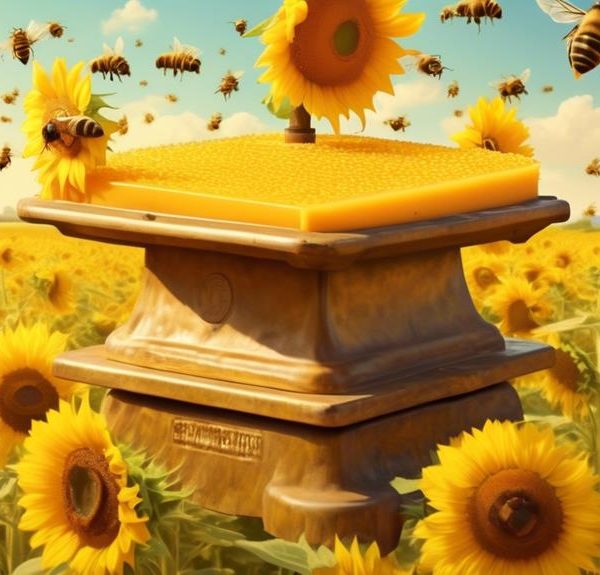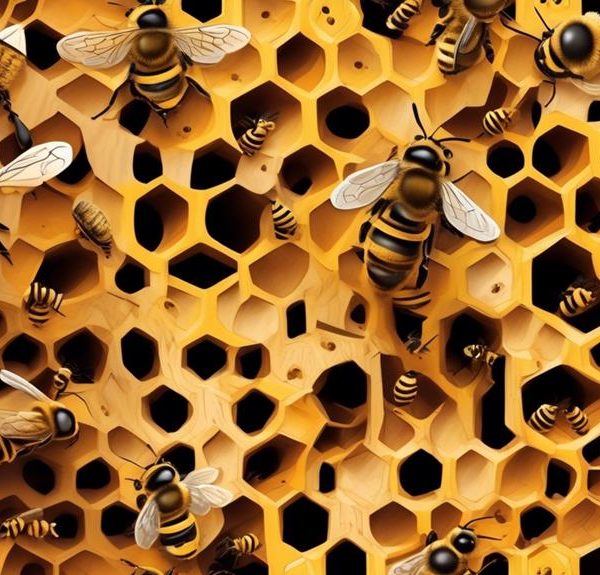Buzz into the intriguing 18th-century English tradition of 'telling the bees' about death, and discover its cultural significance and scientific basis.
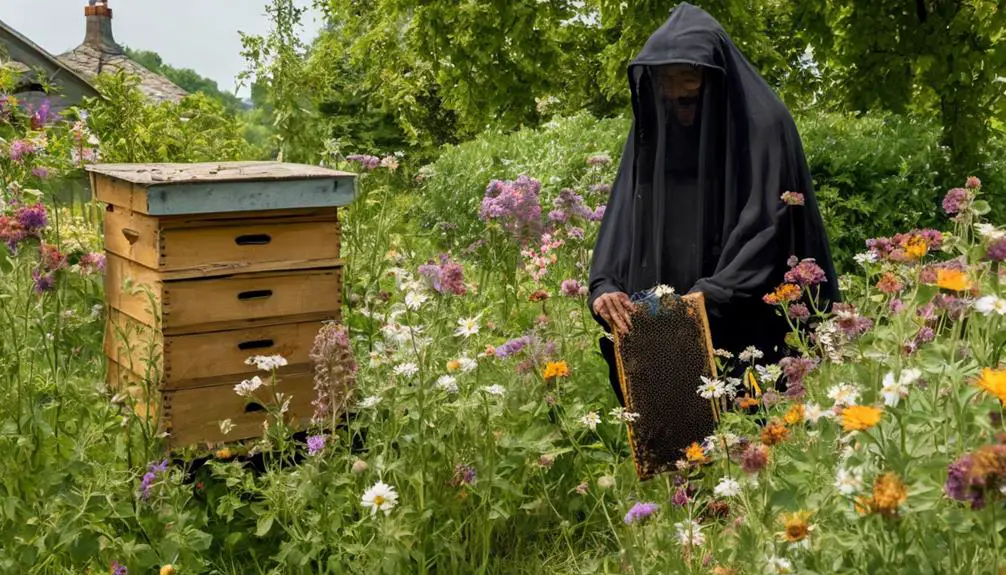
Do You Have to Tell Bees When Someone Dies?
Did you know that in 18th century England, almost 80% of rural families practiced the tradition of 'telling the bees' when a death occurred in the household?
You might find it peculiar, even absurd, that these buzzing insects were informed about such a solemn event. Yet, this ancient custom thrived, deeply rooted in the belief that bees, being highly sensitive creatures, could sense death and abandon their hive if not properly informed.
Now, you're probably curious as to why this seemingly bizarre tradition existed, and if there's any scientific truth behind it. Well, it's high time we unraveled this fascinating cultural mystery.
Key Takeaways
- The bee-telling tradition has deep cultural and religious significance throughout history, with bees being considered sacred creatures and messengers between the mortal and divine worlds.
- Bees exhibit unique behaviors around death, such as undertaking behavior and detecting pheromones emitted by deceased bees to prevent disease spread, showcasing their complex awareness of death's effects on their community's health.
- The modern interpretation of the bee-telling belief connects it to understanding bees as environmental indicators and promotes respect for the environment and stewardship.
- Implementing the bee-telling ritual involves selecting the right time, speaking softly and respectfully, draping the hive with a black cloth as a symbol of mourning, and allowing the bees to 'attend' the funeral by turning the hive to face the procession.
The Origins of Bee-Telling Tradition
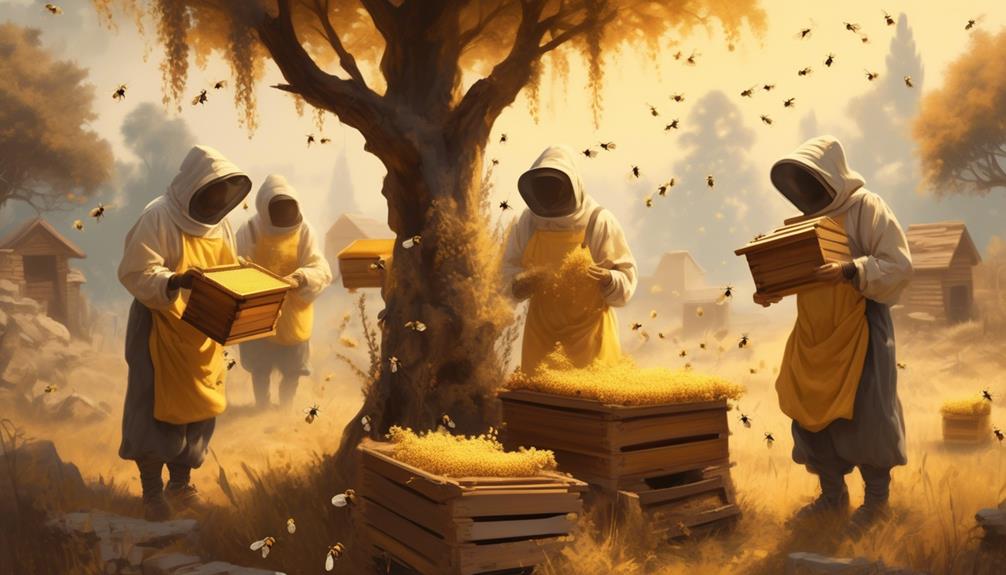
To trace the roots of the bee-telling tradition, you'd have to journey back to the ancient civilizations of Europe, where bees were deeply integrated into their cultural and religious practices. Bees were considered sacred creatures by the Celts, Greeks, and Egyptians, who all believed in their supernatural powers. They were seen as messengers between the mortal world and the divine, delivering news to the gods and spirits.
In medieval times, the tradition became part of English folklore. The custom required the head of the household to whisper to the bees about any significant event, including deaths. They believed that if bees weren't informed, they'd stop producing honey or even die. This practice, known as 'telling the bees,' was a reflection of the symbiotic relationship humans had with these industrious insects.
As the world modernized, this tradition faded in most places, yet it's still observed in some regions of the UK and Eastern Europe. Scientifically, it's acknowledged that bees can sense changes in their environment and human emotions, which may explain the persistence of this ancient custom.
You'll now appreciate the deep historical and cultural significance of the bee-telling tradition.
Cultural Significance Across History
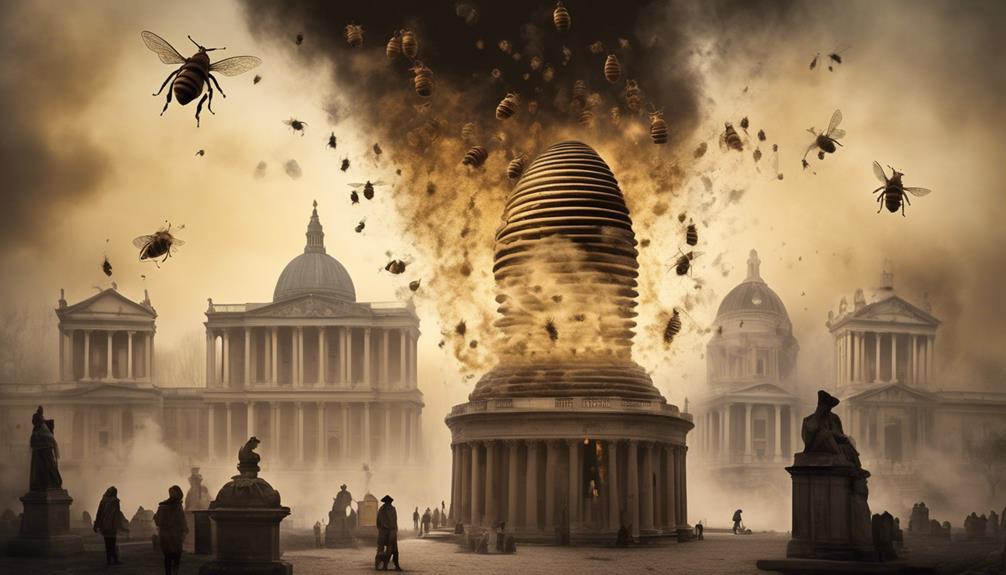
Diving into the cultural significance of bee-telling across history, you'll find its influence in various aspects of life, from literature and art to religious rituals and superstitions. This tradition, based on the belief that bees are a link between our world and the spirit world, has been woven deeply into the social fabric of many cultures.
In European folklore, particularly in the British Isles, the practice of 'telling the bees' has been a longstanding custom. It's thought that if bees aren't informed of their keeper's death, they might leave their hive or stop producing honey. This belief has been reflected in art, with images of people whispering to bees, and literature, with mentions in books and poems dating back centuries.
In religious rituals, bees have been associated with resurrection and life after death. In ancient Egyptian mythology, bees were born from the tears of the sun god Ra, symbolizing renewal. In Christianity, they're often linked to the Virgin Mary, representing purity and motherhood.
Understanding the cultural significance of bee-telling helps you to appreciate why this tradition has persisted. It's not merely superstition; it's a testament to our long-standing relationship with nature.
Scientific Examination: Bees and Death
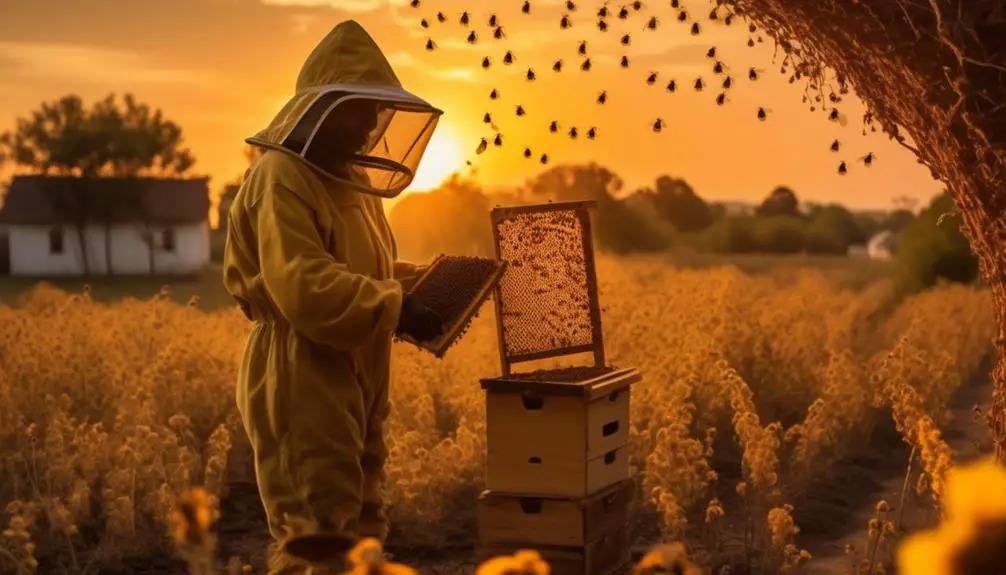
Now, let's delve into the scientific perspective on bees and death, examining how these remarkable insects perceive, react to, and possibly understand mortality.
Bees, particularly honeybees, exhibit unique behaviors around death. They've evolved a system known as 'undertaking behaviour,' where worker bees remove dead or sick individuals from the hive to prevent disease spread.
Research shows that bees can detect pheromones emitted by their deceased comrades. These 'death pheromones', primarily oleic acid, signal to the workers that they need to remove the dead bee from the hive to maintain sanitation. This shows an innate understanding of death's biological implications, albeit not in the human sense.
Interestingly, bees also do 'waggle dances' to communicate. While usually used to indicate food sources, there's speculation that they might communicate other vital information, possibly even death. However, concrete evidence is still lacking.
Bees mightn't understand death as humans do, but their reactions indicate a complex awareness of its effects on their community's health. So, while telling bees of a human's passing may not resonate with them, it's evident that death is a crucial aspect of their societal structure.
Modern Interpretations of the Belief
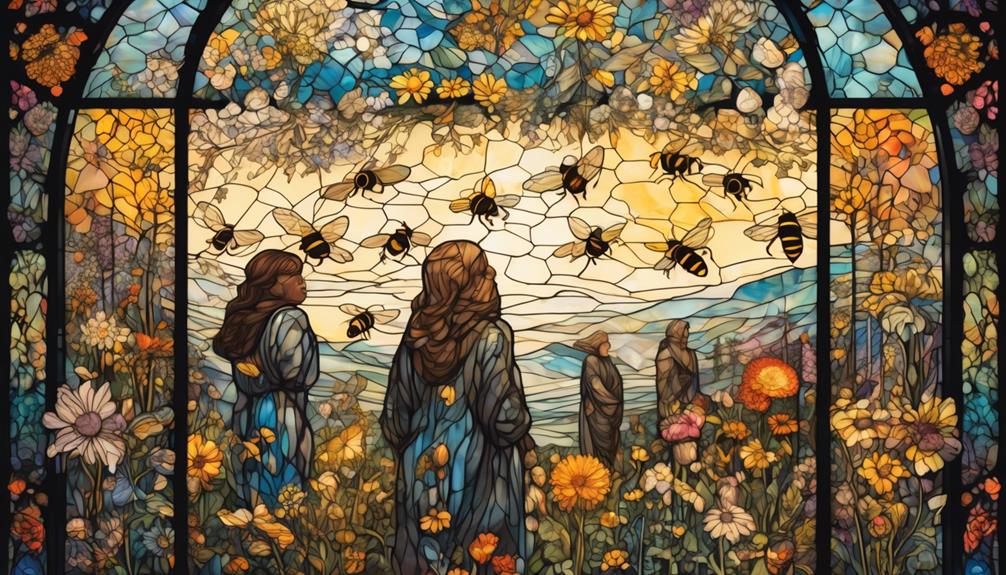
Shifting gears to modern times, you'll find that the ancient belief of telling bees about important life events, including death, continues to hold sway in some cultures and communities. This practice, primarily observed in rural areas of the United Kingdom, Ireland, and North America, is more than just a nod to tradition. It's a testament to the enduring relationship between humans and the natural world.
Modern interpretations of this belief often link it to the understanding of bees as environmental indicators. Bees, in their crucial role as pollinators, are intimately connected to our ecosystems. Any significant life changes, including death, impact the human-bee relationship, and thus, are shared with them.
Some contemporary beekeepers uphold this practice, believing it maintains harmony within the hive. Others see it as a form of mindfulness, a reminder of our interconnectedness with nature. Scientifically, this ritual mightn't have a tangible impact on bees. However, it's undeniable that it impacts us, encouraging respect for our environment and fostering a sense of stewardship towards it.
Implementing the Ritual: A How-To Guide

If you're intrigued by this unique practice and wish to incorporate it in your interactions with bees, let's explore a step-by-step guide on how to properly carry out the ritual of telling bees when someone dies.
The first step involves selecting the right time. It's best to tell bees at twilight, as they're less active then. Speak softly and respectfully, as if you're talking to a friend. Relay the name of the deceased and their relationship to you. It's also important to tell them how the person died.
Next, drape the hive with a black cloth. This is a symbolic act of mourning which is both respectful and necessary. Leave it there for a week to show respect for the deceased.
Lastly, when the person is being buried, turn the beehive to face the funeral procession. This is a sign of respect and allows the bees to 'attend' the funeral.
Frequently Asked Questions
What Are the Potential Negative Consequences if You Don't Tell Bees About a Death in the Family?"
If you don't inform bees about a death in the family, there's a belief that they may stop producing honey or even leave the hive. However, there's no scientific evidence to back this. It's an old folklore.
Your actions, or lack thereof, won't likely have any real negative impact on the bees. They continue their tasks unaffected by human affairs.
It's more about maintaining a symbolic connection between humans and nature.
Are There Any Specific Phrases or Words That Must Be Used When Informing the Bees of a Death?"
No, there aren't any specific phrases or words you must use when informing bees of a death. It's more about the tradition and respect shown in the act itself.
You're free to express the news in your own way. However, it's suggested that you speak softly and respectfully, treating the hive as you'd a person.
Does This Tradition Apply to All Types of Bees or Just Specific Species?"
You're asking about a specific tradition and its applicability to different bee species.
The tradition of telling bees about a death doesn't specify a certain species. It's more of a cultural belief rather than a scientific fact.
There's no concrete evidence to suggest that bees, regardless of their species, understand or react to such news.
Is This Practice Observed Worldwide, or Is It Predominantly Found in Certain Regions?"
You're asking about the geographical distribution of this custom. It's not a worldwide practice. Predominantly, it's found in certain British and Irish communities. These regions hold a deep-rooted belief in 'telling the bees.'
However, you'll also find variations of it in some parts of North America, where it's quite localized. So, while it's not global, there's a fascinating range of cultures that maintain some version of this beekeeping tradition.
Are There Any Contemporary Adaptations of This Tradition in Urban Beekeeping?"
Yes, you'll find contemporary adaptations of this tradition in urban beekeeping. Many modern beekeepers uphold this practice as a way to maintain a strong connection with their hives.
Although not scientifically proven, it's believed that communicating significant life events to bees, including deaths, helps to keep the hive healthy and productive.
It's a unique blend of old-world folklore and modern urban beekeeping that adds a fascinating cultural aspect to the practice.
Conclusion
So, do you need to tell bees when someone dies? Historically, many cultures believed in this tradition. Today, science doesn't back it up but some people find it comforting.
If you're drawn to this ritual, it's simple to implement. Regardless of the truth, it's a beautiful way to honor a life and stay connected to nature. So why not give it a try?
After all, bees are essential to our ecosystem and any interaction inspires respect and care.

